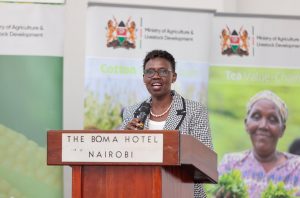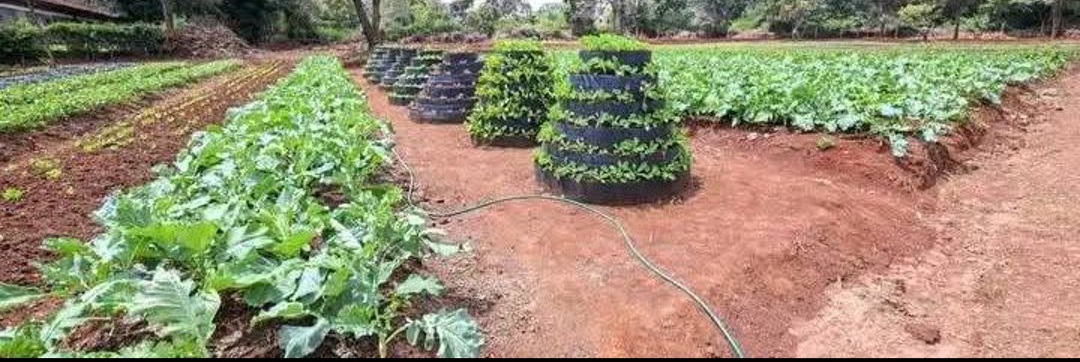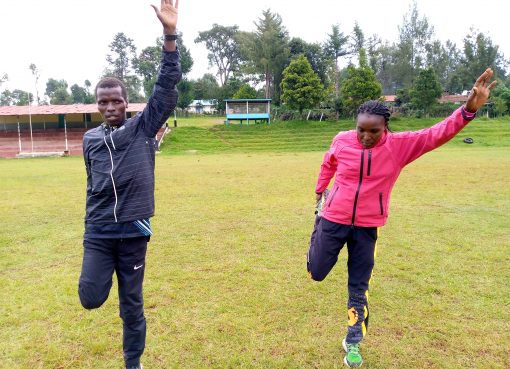Kitchen gardens offer a unique opportunity for families to access healthy diets throughout the year from growing crops such as vegetables and legumes that contain adequate macro and micronutrients.
The ‘Mama Kitchen Garden Initiative’ by the First Lady, Rachel Ruto, aims to have two million kitchen gardens established across one million households and schools, contributing to food and nutrition security.
The Initiative supported by the State Department of Agriculture and ‘MaMa Doing Good’ as key implementers aims to address food insecurity, malnutrition and economic challenges by empowering women to establish sustainable kitchen gardens.
Principal Secretary (PS) State Department for Agriculture Kipronoh Ronoh, speaking during the national ‘mama kitchen garden’ initiative meeting in Nairobi, said that by empowering women to establish small-scale kitchen gardens, we ensure that families have access to fresh, nutritious food and create income-generating opportunities.
“Encouraging families to grow nutrient-dense crops such as vegetables, legumes, and fruits will improve dietary diversity and directly address nutritional gaps in households, especially in children,” said Ronoh.

The PS said the initiative recognizes that the foundation of economic growth begins at the grassroots level, where individuals, particularly women, can drive positive change.
“When women have access to the necessary tools, resources, and knowledge, they invest back into their families, creating a ripple effect that positively impacts the entire community,” he said.
The PS said Kenya has made commendable progress in tackling food insecurity, despite Food security remaining one of the most pressing challenges our nation faces and yet significant challenges remain.
“Despite the progress we have made over the years, we continue to experience significant obstacles, especially in rural areas where access to nutritious and affordable food is limited,” he said.
According to the Kenya National Bureau of Statistics, approximately 30 percent of Kenyan households experience food insecurity, with arid and semi-arid regions being the most affected.
Alarmingly, 26 percent of children under the age of five suffer from chronic malnutrition (stunting), while 11 percent are underweight, a condition that can have long-term detrimental effects on mental and physical development.
The PS divulged that this initiative aligns with the Government’s Bottom-Up Economic Model that focuses on empowering local communities.
Further, he said that it directly aligns with our Food and Nutrition Security Policy, which emphasizes the need to increase access to nutritious food at the household level.
“By supporting women to manage their own food production, we improve household nutrition and also create income-generating opportunities,” he said.
“Our agricultural policies focus on increasing food production and also improving the nutritional quality of the food produced,” he added.
He said the government will ensure that farmers have access to the necessary agricultural inputs, such as high-quality seeds, fertilizers, and water management systems.
He divulged that the success of Mama Kitchen Garden’ initiative will depend not only on policy support and financing but also on the involvement of local communities, the private sector, and the other sector departments.
“Collaboration across all sectors, including government, private sector, civil Society and the community at large is essential to scaling this initiative and ensuring its long-term success,” he said.

Chief Executive Officer of MaMa Doing Good, Elizabeth Koskei, said by empowering families and educational institutions to cultivate their own nutritious produce, we not only bolster food availability but also foster a culture of self-reliance and nutritional awareness.
“By equipping women and youth with the tools and knowledge to grow their own food, we Improve household access to fresh vegetables and fruits, reducing reliance on expensive and less nutritious food options,” she said.
She said Food security remains one of the greatest global challenges of our time. According to the Food and Agriculture Organization (FAO), over 735 million people worldwide faced hunger in 2023.
“These statistics underscore the urgent need for comprehensive innovative and sustainable strategies to address hunger and improve nutrition,” she said adding it represents the daily struggles of millions of Kenyan families.
She said that the initiative is not just about growing food; it is a movement towards economic empowerment, environmental sustainability, and improved nutrition.
She said by partnering with the Ministry of Agriculture, Development Organizations, the private sector, women leaders and local communities to mobilize resources and create awareness, we can scale up these initiatives and ensure their sustainability.
“The initiative will increase income for 1 million women and youth through sustainable agricultural practices and market linkages,” she said, adding that 2 million youth and women will also be trained in climate-smart agriculture and the establishment of kitchen gardens.
She said that the initiative will also see One million table banking groups empowered and supported, enabling financial inclusion and economic resilience.
Uasin Gishu Women Representative Gladys Shollei urged women leaders in both National and County Governments to champion the initiative and take it to grassroots levels in their counties.
“I urge each of you to champion the ‘Mama Kitchen Garden’ Initiative in your communities,” she said, adding that every family should be involved in producing the food they eat.
She urged women leaders to work together to ensure that every household has the knowledge and resources it requires to create its own sustainable kitchen gardens.
By Anita Omwenga




